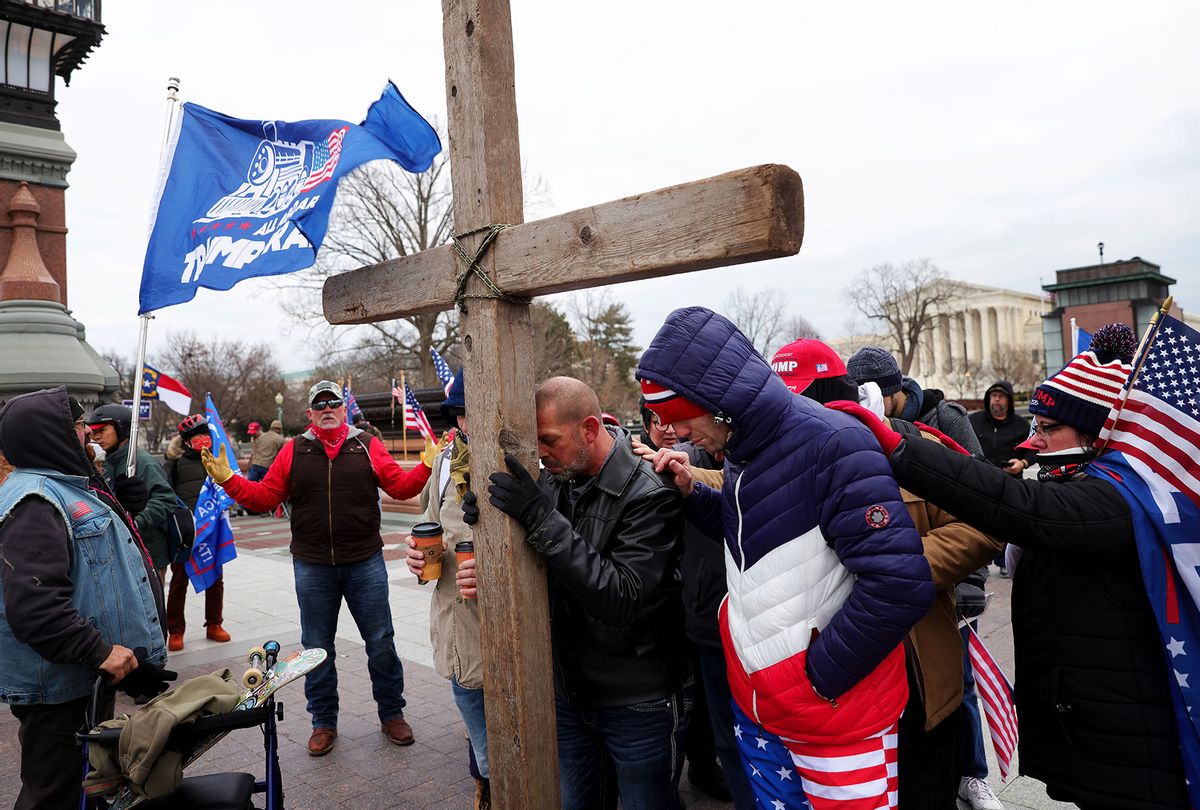White Christian Nationalism and 1/6

When you can carve out 20-30 minutes to read something longer than a snarky LGM post I strongly recommend using that time to read this report on the very close relationship between white Christian nationalism and the January 6th attack on the Capitol.
What’s particularly interesting/frightening is how the report, compiled by scholars and journalists who specialize in studying white Christian nationalism, reveals the extent to which we’re looking at both a top-down and bottom-up phenomenon: that, to analogize to other debates about historical catastrophes, we need both structuralist and intentionalist understandings of what’s happening here, because what it is ain’t exactly clear.
If you only have time right now to read part of it, I would suggest looking at Katherine Stewart’s section on the elite networks that organize and fund white Christian nationalist political action, and even more so Andrew Seidel’s contribution on the events, networks, and people leading up to 1/6.
Here’s an excerpt from Stewart’s essay:
The rank and file come to the movement with a wide
variety of backgrounds, ideas, and interests, and a very
substantial number do not explicitly support anything like
a “theocracy.” Many would be unhappy to learn all of the
details about what their leaders are proposing. Much of
this group votes identity, not policy. When they vote for
the candidates who promise to end abortion or defend
the traditional family or re-unite church and state, they
aren’t explicitly aiming for major fundamental changes
in the way American government is organized; they
are making a statement about who they are, what they
value in themselves, and perhaps what they fear in
other people.
They may also be drawn to the movement’s promise
of certainty in an uncertain world. Against a backdrop
of escalating economic inequality, deindustrialization,
rapid technological change, and climate instability, many
people, on all points of the economic spectrum, feel that
the world has entered a state of disorder. The movement
gives them confidence, an identity, and the feeling that
their position in the world is safe.
Yet the price of certainty is often the surrendering of one’s
political will to those who claim to offer refuge from the
tempest of modern life. The leaders of the movement
have demonstrated real savvy in satisfying some of the
emotional concerns of their followers, but they have little
intention of giving them a voice in where the movement is going.I can still hear the words of one activist I met along
the way. When I asked her if the anti-democratic aspects
of the movement ever bothered her, she replied, “The
Bible tells us that we don’t need to worry about anything.”
Many Americans have underestimated the movement’s
influence on our politics, in part because we often hear
predictions of the movement’s imminent demise — usually
accompanied by reporting on the rising numbers of the
so-called “nones.” These predictions overlook the fact
that you don’t need to win the support of a majority of
Americans to dominate in election cycles or to transform
society through the courts. In a country where around 40
percent of people don’t vote, an organized and committed
minority that turns out to vote in disproportionate
numbers can dominate in election cycles. The politics of
minority rule are further entrenched through flaws in the
American electoral system, such as voter suppression,
gerrymandering, and other antidemocratic practices
that many of the movement’s political allies are intent
on promoting.
This is an important document, containing much crucial information and analysis regarding a threat that the vast majority of Americans who don’t want to live in a fundamentalist Christian theocracy are continuing to underestimate severely, despite everything that has happened, and is happening, and will happen soon.


